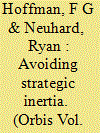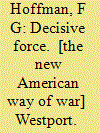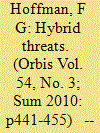| Srl | Item |
| 1 |
ID:
145949


|
|
|
|
|
| Summary/Abstract |
The next Administration will want to examine the last 15 years of strategic performance to improve sound strategy options and to promote timely re-assessment and adaptation of approved policies and strategies. Building off of two recent studies of U.S. decisionmaking and policy implementation at the strategic level, this article examines proposals to enhance the quality of policy making and implementation oversight mechanisms at the National Security Council. Major recommendations are offered to improve interagency planning and the creation of an inter-agency community of national security professionals.
|
|
|
|
|
|
|
|
|
|
|
|
|
|
|
|
| 2 |
ID:
048712


|
|
|
|
|
| Publication |
Westport, Praeger, 1996.
|
| Description |
xv, 150p.
|
| Standard Number |
0275953440
|
|
|
|
|
|
|
|
|
|
|
|
Copies: C:1/I:0,R:0,Q:0
Circulation
| Accession# | Call# | Current Location | Status | Policy | Location |
| 039341 | 355.033073/HOF 039341 | Main | On Shelf | General | |
|
|
|
|
| 3 |
ID:
181997


|
|
|
|
|
| Summary/Abstract |
I am certain of one thing: Colin Gray would be exasperated with claims that “Grand strategy is dead.”1 What he would have called a “banality” is commonplace these days.2 Some question the need for grand strategy; others contend the United States has lost the art of developing one.3 Not that Colin would disagree with the difficulty of strategy, or American shortfalls: “In war after war,” he noted, “America demonstrates an acute strategy deficit.”4 There is certainly plenty of evidence over the past two decades to suggest that a deficiency in conceptualizing and conducting national strategy afflicts the United States.
|
|
|
|
|
|
|
|
|
|
|
|
|
|
|
|
| 4 |
ID:
118310


|
|
|
|
|
| Publication |
2013.
|
| Summary/Abstract |
Many commentators now contend that America's power is in relative or absolute decline. However, Declinists overstate their argument, as America has both a commanding amount of residual power and many enduring strengths. Decline, absolute or relative, is not predetermined. However, retaining our influence and preserving our ability to protect and advance U.S. interests does require addressing key shortfalls in strategic priorities to ensure synergies among the components of U.S. national power. A variety of strategies- particularly Offshore Balancing- have been offered to better balance ends, ways and means. These alternatives suffer from policy, historical and implementation challenges. A hybrid solution, Forward Partnering, avoids these deficiencies and is presented as an alternative grand strategy.
|
|
|
|
|
|
|
|
|
|
|
|
|
|
|
|
| 5 |
ID:
096586


|
|
|
|
|
| Publication |
2010.
|
| Summary/Abstract |
Hybrid threats have now joined a growing suite of alternative concepts about the ever evolving character of modern conflict. Here and abroad, the hybrid threat construct has found traction in official policy circles despite its relative novelty. It has been cited by the U.S. Secretary of Defense in articles and speeches, and by policymakers now serving in the Pentagon. Heretofore, the rapidly growing hybrid threat literature has focused on the land warfare aspects of the threat. Modern hybrid threats, including Hezbollah and Iran, have demonstrated the ability to employ irregular tactics and advanced naval capabilities along with illegal or terrorist activity. Thus, the hybrid threat is applicable to naval forces and the U.S. Navy needs to dust off lessons learned from its last experience in the Persian Gulf in the late 1980s to better prepare for an even more challenging future.
|
|
|
|
|
|
|
|
|
|
|
|
|
|
|
|